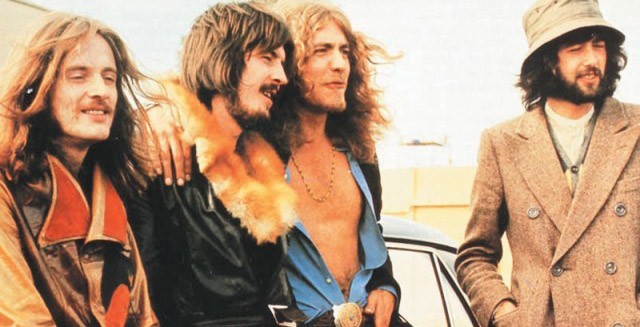I first encountered Led Zeppelin IV as an 8-year-old boy sleeping over my friend Doug Roeser’s house. His college-aged brother John had a poster of the album cover on the ceiling of his room, and Doug and I used to sleep beneath it. The iconic image is of course of that hermit bent over, carrying the bundle of sticks on his back. That image alone would have filled my head with visions and wanderings. Where was he going? What did he need those sticks for? Where had he been and what in this world had bent him over so?
But there was more to light the candle in my young mind. See Doug’s mother used to also get changed for bed in a bathroom across the hall from where we slept, and she would leave the door open. So I would watch her through half-closed eyes, feigning sleep, and my head and heart were on fire.
Somehow those early fantasies and the mystery of that image on the ceiling have merged in my mind and come to embody the sound that I would ultimately discover when I first heard the actual music of Led Zeppelin IV. I suppose Doug’s mother was my lady climbing the “Stairway to Heaven.”
But even without her, the music itself captured my young unformed mind perfectly. For youth is all about freedom and range. And by range, I mean wild ecstasy followed immediately by a crash. It’s Dyonysian. It’s all frantic potential. And everything is the best or worst thing ever.
That’s what that music was to me then, and I think it still is. It’s exotic. It’s unbridled and untamed. It’s a 12-string guitar not just your everyday 6-string. And of course it’s a ton of muscular electric guitars. But there’s horns. There’s flutes. There’s distortion. But there’s also beauty. The guitar in “Going to California,” for example, is just stunning. And then there’s Robert Plant. Holy. My voice, when I found it, couldn’t be further from his tone and style. But what could be a better influence on somehow who would one day want to sing than hearing that kind of emotional and physical freedom in a voice?
I don’t think I’ve ever cited Led Zeppelin as an influence. But when I think back on this time of discovery, I’m so grateful that I found the band and this album when I did. For subliminally, if not actively, I think it taught me that music had the power to make a listener dream, had the power to turn a world from black and white into color, had the power to free the mind and unleash the spirit.
I remain,
David Berkeley

